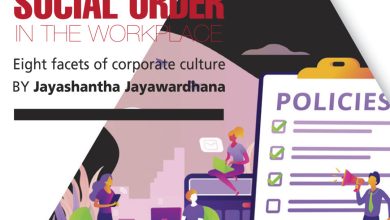SME DEVELOPMENT

CHANGE READY ENTERPRISES
Dr. Muneer Muhamed elaborates on how SMEs can become resilient and agile

Economies everywhere are shaped by volatile geopolitics, shifting tariffs, technological upheavals, capital market tremors and sudden disruptions.
SMEs form the backbone of most economies. Turbulence has been devastating for many of them in recent years and many have foregone available opportunities. The one factor that now separates resilience from ruin is change readiness.
Large enterprises have buffers with easier access to capital, strong connections with regulators and lobbying power to swing policy in their favour. Small and medium-size enterprises operate on slimmer margins and with more constraints – and their survival depends on agility.
Being change ready is an existential issue for them.
Consider SMEs in Sri Lanka’s apparel industry. When sustainability norms are made more stringent by global giants, the question of affordability arises for these enterprises. Change readiness to embrace eco-friendly dyes, digitalisation and transparent labour policies help some retain their existing buyers.
Technology is transforming business faster than ever. SMEs find it useful but have to worry about cost-benefit optimisation. Digital platforms, mobile payment systems, AI driven analytics and so on are all viable methods to cut costs and ensure efficiency.
During the pandemic, tea exporters who embraced e-commerce platforms managed to reach international customers directly by bypassing disrupted intermediaries.
But it can be fatal for businesses that can’t keep pace with tech advancements. A retailer who refused to adopt digital payments found itself out of business because customers preferred cashless convenience.
Change readiness isn’t about buying every new tool but rather, a willingness to integrate relevant technologies quickly and effectively.
With increasing interconnectedness, SMEs must revisit their export strategies and learn about different consumer behaviour – whether it’s spices in Europe or halal certified processed meat for the Middle East. It’s essential to meet each market’s demands for sustained business and change readiness is needed to transform mindsets from a local focus to a global outlook.
A local spice exporter changed its packaging and certification processes to meet the halal standards of the Gulf Cooperation Council (GCC); and although it wasn’t easy, this helped the exporter gain a foothold in that lucrative market.
Without readiness to change, doors remain closed.
From currency devaluations and fuel shortages due to COVID-19, and economic bankruptcy, Sri Lanka’s SMEs have seen it all over the past few years. Resilience was essential in all such instances; and to this end, change ready businesses maintained cash reserves, diversified supply chains and built contingency plans.
Change readiness includes strategies and people too.
Enterprises that establish a culture of learning, upskilling and innovation build resilience, retain talent and stay competitive. In the ICT sector, entities that allowed young engineers to experiment with blockchain and AI are now exporting globally while others have lost their best talent.
Another challenge is regulatory changes in tax policies, trade tariffs and compliance requirements. Businesses that embrace change readiness in policy monitoring, compliance and potential reforms will face crises well, and thrive in disruptions.
Customer preferences shift quickly and loyalty can’t be taken for granted. Enterprises must be nimble enough to face the changing expectations of stakeholders.
SME’s account for over half of Sri Lanka’s GDP and employs millions of people. Their survival and growth are critical for building the nation; and their future can’t be decided by subsidies or short-term incentives. Success will have to be led by how well they cultivate the muscle of change readiness.
It’s this mindset that transforms crises into opportunities, disruptions into breakthroughs and small businesses into resilient engines of national progress. Being change ready is no longer a competitive advantage; instead, it’s critical for survival.
SMEs in Sri Lanka can hardwire change readiness into their DNA by leading from the front because adaptive leaders inspire confidence in facing crisis and uncertainty. A flexible work policy makes working from anywhere a standard. This will attract talent, boost productivity and improve adaptability.
Continuous learning will ensure that employees are future ready. And agile decision making enables employees to make quick, informed decisions with communication channels that are open to higher levels.
Constructive partnerships with peers, associations and others enable resource sharing and risk mitigation. And a culture of innovation encourages risk taking and experimentation through sandboxes.
SMEs should stay customer focussed, seek feedback and create new offerings. Roughly right and fast should be the mantra. And financial acumen protects cash flows, and keeps reserves handy.
Enterprises must be nimble





